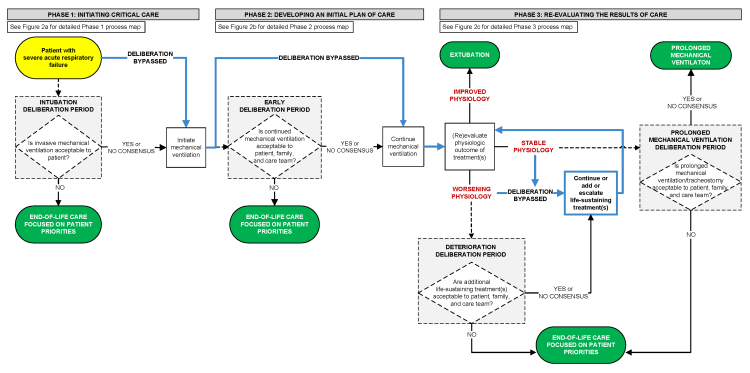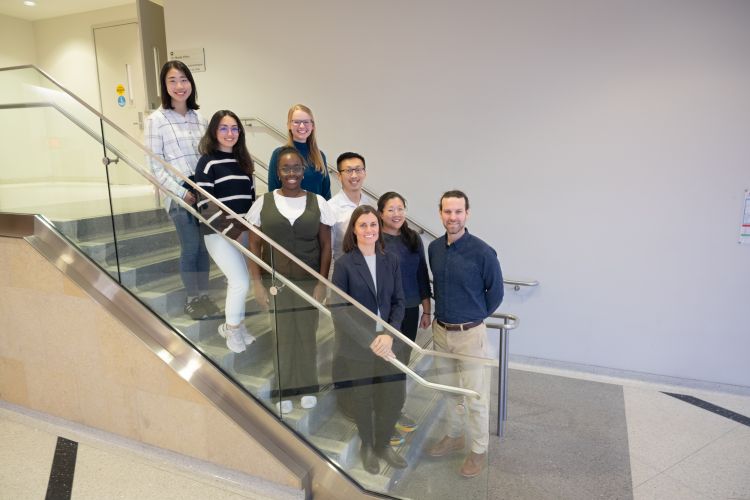Improving Health Care Delivery in the Intensive Care Unit
Jacqueline Kruser, MD, MS, is a pulmonologist and critical care physician whose research aims to improve healthcare delivery and decision making for patients with critical illness.
Dr. Kruser’s research team uses cross-disciplinary methods from health services research, engineering, and medical social sciences to improve the ICU system to better meet the needs of patients, their families, and ICU clinicians.

Decision Making about Life Support
Mechanical ventilation is a form of life support for patients with acute respiratory failure. Unfortunately, not all patients with respiratory failure who need mechanical ventilation survive and recover.
Decision making about stopping or prolonging the use of life support in patients who are not recovering can be very burdensome for patients, their families, and clinicians.

A Process Model of Intensive Care
Dr. Kruser’s research team is working to find new ways to help support these types of challenging decisions. She and her collaborators have partnered with patients, family members, and members of the interprofessional medical ICU and palliative care teams to better understand how these difficult decisions are currently made.
In collaboration with engineers who specialize in healthcare delivery, her research team has developed a detailed process model that illustrates the complex series of events and interactions that take place during an ICU stay that influence decisions about mechanical ventilation.
The team is currently investigating the critical periods in the model where active deliberation occurs between patients, their families, and clinicians.
Click image to enlarge, or view PDF in Box.
Research Team
Researcher I
Research Intern
Clinical Research Coordinator
Collaborators, Students and Trainees
Collaborators
- Matthew Churpek, MD, MPH, PhD; Majid Afshar, MD, MSCR; and the UW ICU Data Science Lab
- Sarah Esmond, MS
- Jane Holl, MD, MPH
- Margaret "Gretchen" Schwarze, MD, MPP, FACS
- Douglas A. Wiegmann, PhD, and other colleagues at the Wisconsin Institute for Healthcare Systems Engineering (WIHSE)
- Bret Hanlon
- Lily Stalter
- Dr. Robert Arnold
- Dr. Justin Clapp
- Dr. Nandita Nadig
- Dr. Elizabeth Viglianti
- Dr. Katherine Secunda
- Dr. Scott Halpern
Fellows
- David Deemer
- Sarah Van Dorin
Residents
PhD students
Medical students
- Josephine McCartney
- Molly Pistono

If you are interested in joining our group, please send your CV and a brief description of your research experience and interests to Dr. Kruser.
Active Projects
- A Systems Approach to Align ICU Care with Patient Treatment Goals
Almost 400,000 people in the United States develop the syndrome of chronic critical illness each year, and many older adults with this condition receive high-burden, invasive medical treatments near the end-of-life. This project draws from cross-disciplinary methods in systems engineering and qualitative research to develop a new way to help patients with chronic critical illness make medical decisions that reflect their personal goals, values, and preferences.
- Time-Limited Trials to Improve the Care of Mechanically Ventilated Adults
Time-limited trials in intensive care are a care-delivery strategy where clinicians, patients, and families agree to try life support for a period of time and then re-evaluate continued use based on how the patient responds to treatment. Despite increasing interest in time-limited trials, very little is known about how best to use these trials to support patients, families, and clinicians. The goal of this study is to determine the mechanisms, feasibility, and acceptability of time-limited trials of mechanical ventilation in the ICU in order to optimize their effectiveness and safeguard against unintended harms.
- Improving ICU Care for Older Adults with Serious Illness
Many older adults across the United States experience inadequate palliative and end-of-life care in the ICU. This results in burdensome treatments for patients and psychological distress among their families. Time-limited trials are endorsed by palliative and critical care professional societies, and have potential as a way to improve ICU care for older adults. However, little is known about patient and family caregiver viewpoints on this approach. With this project, we seek to understand patient and family perspectives on this care model and are designing a graphic aid to support conversations between ICU clinicians and surrogate decision-makers.
- Understanding how the ICU physical environment affects clinician-family communication
Effective communication with family members and surrogate decision-makers is essential in ICU settings, yet the role of the built environment in facilitating this communication remains underexplored. This study uses spatial analysis and semi-structured interviews with clinicians to examine the various built environments within and adjacent to ICUs. We aim to assess how physical spaces impact family communication in critical care and identify potential design solutions to improve these interactions.
- Understanding surrogate-reported “goals of care” for patients in the ICU
Differences in end-of-life care among minoritized racial and ethnic groups are well-documented. However, much of the prior research has focused on the completion and quality of goals-of-care discussions rather than the specific goals articulated by patients or their surrogates. This project aims to explore the associations between key patient demographics and comorbidities with surrogate-reported goals of care in ICU patients, providing insights into the factors that shape these preferences.
Funding Support
Dr. Kruser’s research is funded by the National Institutes of Health/National Heart, Lung and Blood Institute and the Wisconsin Partnership Program (WPP) New Investigator Program.
News and Media
- Needs and Goals: The Role of Language in the Momentum of Critical Illness (Department of Medicine video, 2024)
- Kruser – The Role of Language (Maryland Critical Care Project video, 2024)
- Reconsidering the Language of "Need" in Serious Illness (Friday Chalk Talk - Palliative Care video, 2023)
- Jacqueline Kruser, MD, shows how careful communication leads to better care (Department of Medicine article, 2023)
- The Language of Serious Illness: A Podcast with Sunita Puri, Bob Arnold, and Jacqueline Kruser (GeriPal podcast, 2023)






